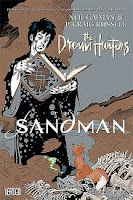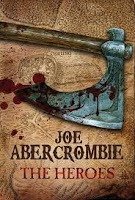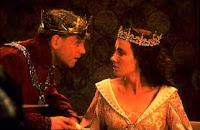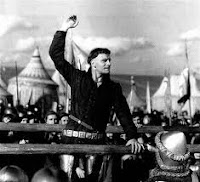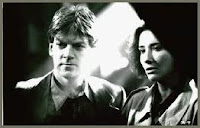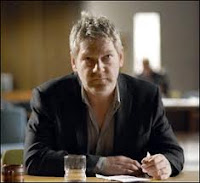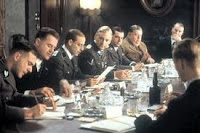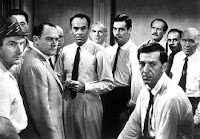
Tributes to Sidney Lumet have concentrated, and rightly so, on his major pictures and his knack for giving actors real chances to shine. But there is a danger of seeing him, particularly in light of
12 Angry Men being his first film and
Network being arguably his best-known, and the one with the best sound-bite clip for obits, as a social realist, if not a satirist, or looking at his work along the lines of many of the other directors who came out of live television in the 1950s and went on to make the kind of earnest, feel-good work Hollywood loves to honour with Oscars (cf
The King's Speech).
Network has more of an edge than most such films, but at the same time it is far from Lumet's best work; it lacks subtlety, even when considered as a farcical black comedy, and like many of his films it resolves itself mechanically. But there's no question that Lumet deserves to be noted as a major director of crime films, as both
12 Angry Men and
The Verdict have to be counted among the top courtroom thrillers, and they are by no means his best crime films.
And while it's important to recall Lumet's grounding in theatre (and the Actor's Studio) that background combined with his work in the early days of live television to produce a style which to many seemed utilitarian, albeit actor-friendly. Live TV offered most of the limitations of theatre (closed sets, limited casts) intensified by the audience's dependence on the single camera's point of view; a dependence which Lumet quickly turned into an asset with use of close-up and very quick cutting to create the illusion of action, or better, to draw the inner action out. Most of his best films let the actors work in extreme close-up, and those close-ups usually come quickly from ensemble shots that define the characters: once they take centre stage; think not just of Peter Finch in
Network but say,

Henry Fonda in
12 Angry Men or Paul Newman in
The Verdict.
12 Angry Men, released in 1957, was actually adapted from an original teleplay; of his next five films, four were adapted from plays.
The Fugitive Kind (1960) is pure Tennessee Williams meets Actor's Studio, but Lumet injects
Long Day's Journey Into Night (1962) with an energy that transcends O'Neill's words; it remains one of the great filmed plays, and Katharine Hepburn one of O'Neill's greatest interpreters. I haven't seen Lumet's TV version of
The Iceman Cometh (1960), with Jason Robards and a young Robert Redford, but it is now available on DVD.
It's interesting to watch him progress through filmed theatre:
The Sea Gull (1968) with Vanessa Redgrave, James Mason and Simone Signoret, Robert Marasco's
Child's Play (1972) again with Mason, Robert Preston and Beau Bridges, and later smaller productions with big-name actors: Peter Shaffer's
Equus (1977) with Richard Burton and Ira Levin's
Deathtrap (1982) with Michael Caine and Christopher Reeve, in what is as much a crime film as his
Murder On The Orient Express (1974) is a filmed play.
Most of Lumet's best films are those which are set in the corrupt world of New York City politics and policing.
Serpico (1973),

which is the one people gravitate onto, was the entry point for Lumet, and part of that great revival of New York crime movies sparked by
The French Connection. It may be the key film in Lumet's career: it's conducted via close-ups of method acting Al Pacino set against a paranoid world in which he never knows who among his cop colleagues and bosses and politicians is corrupt and a threat. His paranoia turns out to be fully justified. Although Lumet returned to that dark side of New York corruption repeatedly, it seems to me that Serpico and its urban paranoia, make it closer to films like
Midnight Cowboy, and as such it and its successor
Dog Day Afternoon (1975) are less connected with Lumet's later, more sombre, crime films than they are with
Network; all three concerned with frustrations about the mores of society and its institutions, as revealed by almost insane paranoids.
The later crime and corruption films provided Lumet with a different theme, with a framework, and with the perfect way of blending the lead character back into the ensemble, getting away from Pacino and Finch. The best of the films I'd call his 'New York cycle' (and include
Serpico and
Dog Day if you insist), and

maybe the best of all his films, was
Prince Of The City (1981), with Treat Williams proving Lumet's skills with actors who never quite became stars. In fact, there are no stars, it's full of lesser-known New York actors, like Jerry Orbach, and the ensemble feel gives it a 'you are there' character (
You Are There, hosted by Walter Cronkite, was a series Lumet worked on in the 1950s, which reenacted moments of history in docu-drama fashion).
Prince was followed by
The Verdict, which I'm tempted to include in this cycle even though its setting is Boston, and even though as a vehicle for one of Paul Newman's absolute best performances, it's closer in some ways to
Serpico or indeed
Network, though in this case Newman is brought back from the edge. Jack Warden leads a brilliant supporting cast, including James Mason and Edward Binns. If David Mamet's script becomes mechanical as his then-wife Lindsey Crouse cracks up on screen, Newman's rebirth carries it off. However the edge Mamet brings to the tempatations of evil is what is missing from the next two of Lumet's New York cycle:
Q&A (1990), with Nick Nolte doing the Newman,
Night Falls On Manhattan (1996), like Prince based on a Robert Daley book, and this time with Andy Garcia as Treat Williams/Newman and Richard Dreyfuss chanelling Jack Warden. Lumet's late-career return was marked by the last of this cycle,
Before The Devil Knows You're Dead (2007), which is less concerned with institutional corruptions, and more with families, with fathers and sons, but which captures that feeling of uncertainty in relationships that ought to be certain. Or you could look at it as a serious version of the unfunny comedy
Family Business, made almost 20 years earlier.
Many critics think of Lumet the way David Thomson described him: a solemn, often humourless adapter with no personal signature. Certainly he has made some clunkers, some in the 80s, more in the 90s, when his choice of material seemed flawed—and sometimes despite getting good performances from people you might not expect to deliver. But looking at some of his more overlooked films tells us something about Lumet's real strengths. Yes, if his sense of humour were better the black comedies might have more edge --
Fail Safe (1964), of course, for all its many strengths, which were never more apparent when George Clooney and Stephen Frears paid homage to it with their

live TV version in America, will always be covershadowed by the satirical farce of
Dr Strangelove-- but no one seems to remember
Bye Bye Braverman (1968) which was very funny indeed. It probably reflects Lumet's upbringing with parents in Yiddish theatre, and indeed the bit I remember best from it is the excellent Godfrey Cambridge as a black, Yiddish-speaking, New York cabbie, and the brilliant Warden, whose career might have been sterling even if he'd never acted in anything but Lumet's movies.
Another film no one seems to recall is
Lovin' Molly (1974), his next film after Serpico. It's an odd, almost urban adaptation of Larry McMurtry's excellent novel
Leaving Cheyenne, one of his modern westerns like
Horseman, Pass By (
Hud) or
The Last Picture Show which preceded his epic westerns. You might think Lumet was trying to cash in on the success of Peter Bogdanovich's film. The book is
Jules et Jim set in Texas; two very different men in love with the somewhat difficult Molly, and is told in three parts, by each character in succession, at twenty year intervals. I call the film almost urban because the casting and indeed the settings do little to suggest the Texas background which is so rich in the novel. Beau Bridges is fine as the easy-going man, and Blythe Danner handles Molly with aplomb, especially if you don't try to believe she's Texan. The same applies in spades to Anthony Perkins. It's not quite the miscasting of
Fear Strikes Out,

because part of the story is the way his sensitive boy is a disappointment to his father, played with a bit more Texas ornery-ness by Ed Binns, who gets the great quote when explaining to his son (Perkins) why Molly isn't worth worrying about: 'A woman's love is like the morning dew: it's as just as apt to settle on a horse turd as a rose'.
I also have a lingering fondess for
Daniel (1983) from EL Doctorow's fictionalised Rosenbergs, again partly for its New York casting, including Mandy Patinkin, Ed Asner, and Tovah Feldshuh.
The Morning After (1986), with Jeff Bridges and a surprisingly good Jane Fonda, might be considered a near miss, but among the crime films it's hard to raise much affection for
A Stranger Among Us 
(Melanie Griffith with the Hasidim should have made a great comedy),
Guilty As Sin (Don Johnson can't repeat
Hot Spot with Rebecca DeMornay) or
Find Me Guilty with Vin Diesel. Luckily, Lumet's reputation doesn't have to rest with these films. In fact, it doesn't have to rest on his crime films at all, there is too much else to consider. But considered on his crime work alone, he is a major director.
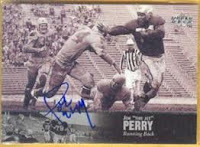 My obituary of Joe 'the Jet' Perry is in today's Independent, you can link to it here. Obviously, I had to keep it simple enough for a non-football audience (and the definition of 'scatback' the Indy provided is not very accurate--McElhenny's dodging, darting style complemented Perry's) but there was a lot more to say, most of which would have showed my age, and my increasingly obvious old fogey disposition.
My obituary of Joe 'the Jet' Perry is in today's Independent, you can link to it here. Obviously, I had to keep it simple enough for a non-football audience (and the definition of 'scatback' the Indy provided is not very accurate--McElhenny's dodging, darting style complemented Perry's) but there was a lot more to say, most of which would have showed my age, and my increasingly obvious old fogey disposition.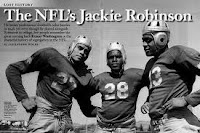 Woody Strode, Kenny Washington, and Jackie Robinson all played professionally in the Pacific Coast Football League, which, like its baseball equivalent, was somewhat better than a 'minor' league. Interestingly, the Indy is also holding my obit of Wally Yonamine, who, before he was abused for being the first American to play baseball in Japan, suffered racial abuse in the PCFL for being the first Japanese-American to play pro football!
Woody Strode, Kenny Washington, and Jackie Robinson all played professionally in the Pacific Coast Football League, which, like its baseball equivalent, was somewhat better than a 'minor' league. Interestingly, the Indy is also holding my obit of Wally Yonamine, who, before he was abused for being the first American to play baseball in Japan, suffered racial abuse in the PCFL for being the first Japanese-American to play pro football!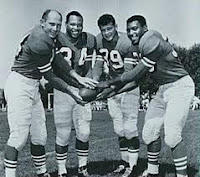 who played college ball at LSU, was the QB for Baltimore when the hotel incident occured. It's a neat distinction to note that the Million Dollar Backfield was half white (Tittle, McElhenny) and half black (Perry, Johnson), and oddly, neither Tittle nor Johnson would likely be in the Hall of Fame except they went on to bigger and better things when they left San Francisco. Sometimes there just isn't enough glory to go around.
who played college ball at LSU, was the QB for Baltimore when the hotel incident occured. It's a neat distinction to note that the Million Dollar Backfield was half white (Tittle, McElhenny) and half black (Perry, Johnson), and oddly, neither Tittle nor Johnson would likely be in the Hall of Fame except they went on to bigger and better things when they left San Francisco. Sometimes there just isn't enough glory to go around.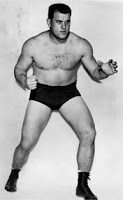 There were six Hall of Famers on that team in the mid-1950s, but they still couldn't win a title. And there was Alley-Oop Owens, who invented, with Tittle, the Alley-Oop pass. But that's another story....
There were six Hall of Famers on that team in the mid-1950s, but they still couldn't win a title. And there was Alley-Oop Owens, who invented, with Tittle, the Alley-Oop pass. But that's another story....